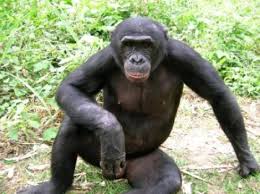记忆方法
1. 不给花生吃是,猴子会叫ei
中文词源
ape 类人猿
词源不详。
aperitif 开胃酒
来自法语。词根aper, 开口,打开。
英语词源
- ape
-
ape: [OE] Ape (in Old English apa) has cognates in several Germanic languages (German affe, Dutch aap, Swedish apa), and comes from a prehistoric West and North Germanic *apan (perhaps originally borrowed from Celtic). Until the early 16th century, when English acquired the word monkey, it was the only term available for any of the non-human primates, but from around 1700 it began to be restricted in use to the large primates of the family Pongidae.
- ape (n.)
- Old English apa "ape, monkey," from Proto-Germanic *apan (cognates: Old Saxon apo, Old Norse api, Dutch aap, German affe), perhaps borrowed in Proto-Germanic from Celtic (compare Old Irish apa) or Slavic (compare Old Bohemian op, Slovak opitza), perhaps ultimately from a non-Indo-European language.
Apes were noted in medieval times for mimicry of human action, hence, perhaps, the other figurative use of the word, to mean "a fool." To go ape (in emphatic form, go apeshit) "go crazy" is 1955, U.S. slang. To lead apes in hell (1570s) was the fancied fate of one who died an old maid. - ape (v.)
- "to imitate," 1630s, but the notion is implied earlier, as in the phrase play the ape (1570s), Middle English apeshipe "ape-like behavior, simulation" (mid-15c.); and the noun sense of "one who mimics" may date from early 13c. Related: Aped; aping.
权威例句
- 1. When Colonel Harper found out, he would go ape.
- 哈珀上校发现了一定会勃然大怒。
- 2. The new finds have deepened our knowledge of giant ape.
- 新的发现物加深了我们对巨猿的认识.
- 3. Man has evolved from the ape.
- 人是从类人猿进化而来的.
- 4. Men are descended from ape - men.
- 人是由类人猿转变而来的.
- 5. Methods clinical data of 10 patients with APE were analyzed.
- 方法 对10例确诊为APE病人的临床资料进行分析.
